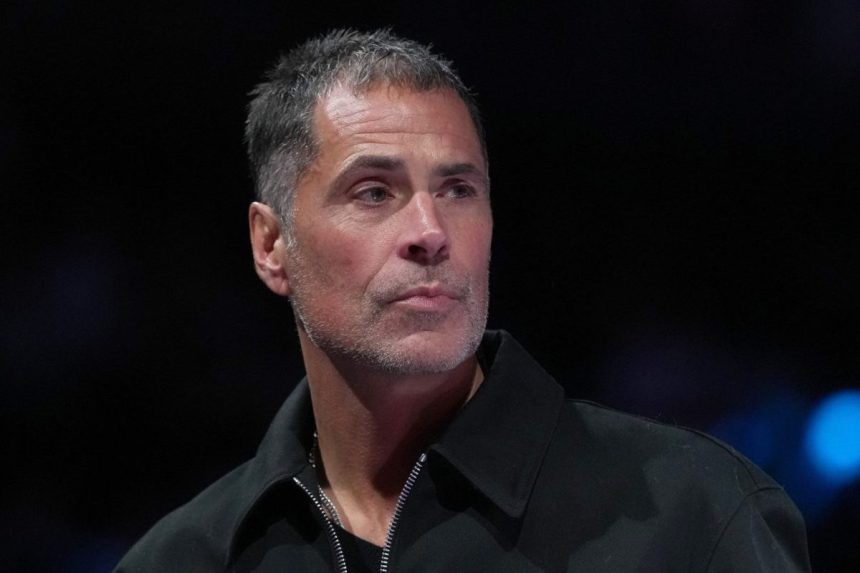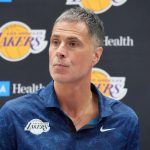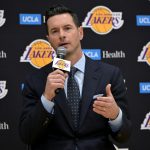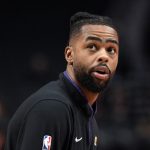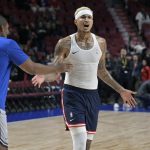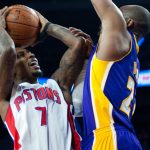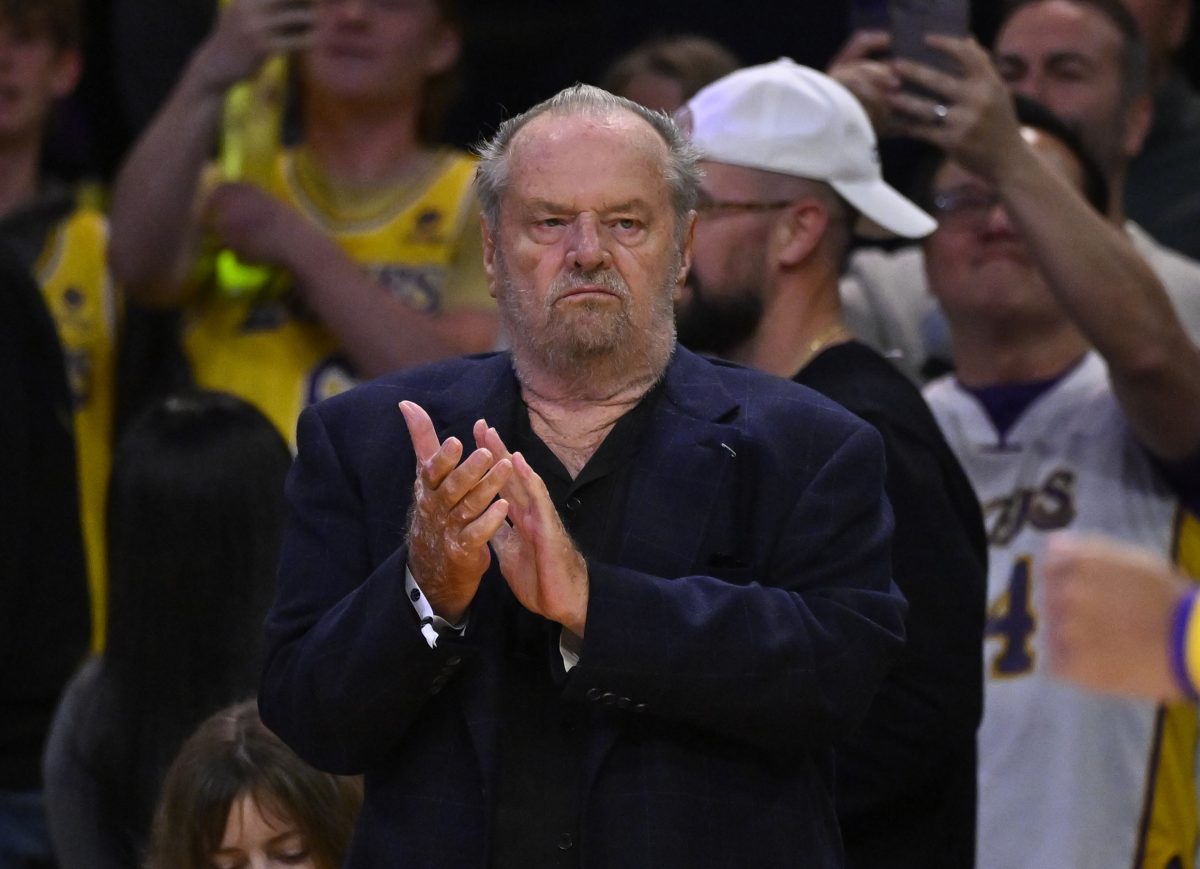With losses this last week to both the Sacramento Kings and Golden State Warriors, the Los Angeles Lakers are facing an almost impossible climb out of the 10th seed before the Play-In Tournament. Should the season end either before the actual playoffs or early in them, Darvin Ham would almost surely be fired. Given what he’s done with head coaches, though, Rob Pelinka hasn’t shown he is capable of making that decision or finding Ham’s replacement.
When Magic Johnson resigned shockingly at the end of the 2018-19 season, he went on a media tour to explain to try to explain to everyone that he couldn’t fix everything that needed to be fixed with the Lakers and never felt fully supported in his attempts to do so. One example he cited was his desire to fire Luke Walton and the pushback he received from, well, someone.
“Oh, I knew he wasn’t,” Magic said of Walton and his capability to coach the Lakers. “And so I said, ‘Hey, we’ve got to let him go. He’s not the right guy; he is not a great coach for the Laker team.’ And they wanted to keep him. So, I said, ‘Okay.’ I already knew that I didn’t want to fracture the great relationship I had with Jeanie Buss, because that’s my sister. So, and instead of me sitting there – and I can never be this dude that just sits and not says what’s on my mind – I said, ‘Let me just exit. It’s going to be best for everybody.’
“I felt some dudes wanted to be in the seat that I had. So, hey, you let ’em have it. You go ahead. You can have it. I’m out. And Jeanie and I are still great friends, so it was the best move and I’m glad I did it.”
The message was pretty clear: Someone (Buss) didn’t want Walton fired and someone else (Pelinka) wanted Johnson’s job. Johnson claimed he felt backstabbed and it isn’t that far a leap to assume Pelinka went along with Buss’ wishes, seeing an opportunity to slip into more power. Pelinka’s ploy worked and, after Johnson stepped down, Pelinka became the lone basketball operations decision maker.
Ironically, Walton was still fired anyway and the Lakers embarked on one of the most bizarre head coaching searches in recent memory.
At the time, the choice seemed straightforward. Tyronne Lue was available and had previously won a championship with LeBron James with the Cleveland Cavaliers. He became the Lakers’ top choice, with Monty Williams, Jason Kidd and Frank Vogel receiving consideration.
According to Lue (via ESPN), the Lakers lowballed him with a three-year offer worth $18 million. The contract he eventually accepted to coach the Clippers was for five years, $35 million. He felt the Lakers saw him only as James’ coach and aligned his offers with James’ contract at the time. James has played well beyond that original contract, making Pelinka’s approach all the more shortsighted.
Furthermore, the breaking point in negotiations occurred when the Lakers wanted to force Kidd onto Lue’s staff.
While the Lakers continued their staring contest with Lue, Williams accepted an offer to coach the Phoenix Suns. When the subject of Kidd’s criminal background made him an unsuitable head coach candidate, the Lakers offered the gig to the last man standing, Vogel, and also made Kidd the highest paid assistant coach in the league — a move many saw as hiring Vogel’s eventual replacement whenever he would almost definitely not meet expectations.
Unfortunately for Pelinka, who sources say, preferred Kidd, Vogel won a championship in his first season. Normally, the reward for doing so is a nice, lengthy extension, right? Well, not this time. As Pelinka never truly believed in Vogel, he did the absolute least he could, extending him a single season beyond his original contract.
Pelinka also okayed the Russell Westbrook trade, let Alex Caruso walk and re-signed Talen Horton-Tucker (the guy he drafted) in the ’21 offseason, and then didn’t address any of that team’s obvious flaws at that year’s trade deadline. The Lakers finished with a 33-49 record and Vogel’s firing was reported mere minutes after the final game ended.
Vogel, a coach who helped bring a championship to the Lakers, had to answer questions about his own firing during a postgame press conference.
Things got so toxic at the end of Vogel’s tenure that some inside the Lakers organization wondered if Pelinka intentionally sabotaged the head coach, citing how that final roster that did not mesh in any way with Vogel’s coaching ideologies. Vogel preferred and won with bigger, physical, defensive-minded teams. That ’22 roster had an insane 11 guys 6’4″ and under, three others listed at 6’5″ and never employed even a reasonable backup center. All year, fans were told not to judge the team until a then 36-year-old Trevor Ariza made his return.
Several guys on that roster never played in the NBA again after that season, but it was the coach who paid the price for that disappointment — not the team’s architect.
Rather than ditching the clearly failing Westbrook experiment, Pelinka set out to find a coach who would promise to get the best out of the former MVP. In stepped Ham. In many ways, though, Westbrook and the rest of that season’s flawed roster drew attention away from Ham’s own shortcomings.
Tried as he might, Ham could not make it work with Westbrook. The Lakers got off to a 2-10 start. To make matters worse, Pelinka built that roster with a Westbrook trade in mind, so once again, it was tiny. At one point in the season, Austin Reaves infamously played center. No, really, Ham trotted a lineup out there of Reaves, Westbrook, Patrick Beverley, Dennis Schröder and Lonnie Walker IV.
The Lakers trudged through the first half of that season, and by the time Westbrook was mercifully sent to Utah in a three-team trade, the Lakers sat at 25-31. With Westbrook out of the way, they went on a run that reached not only the postseason, but the Western Conference Finals.
Matt Ryan played more minutes opening night than Reaves. Far too often, lineups featured at least one too many small guards and hemorrhaged points as a result. In the playoffs, Ham certainly pushed many of the right buttons, but he also tended to adjust a game too late, and now, according to D’Angelo Russell, lacked as a communicator.
Those same issues have leapt back up with resounding force this season. Several reports have surfaced about questions in Ham’s locker room about his ability to coach an NBA team. At no point this year, has a player stepped up to support Ham, either. Instead, Russell sat down with ESPN and essentially confirmed many of those reports. Ham’s only public support came from The Athletic, when it was reported Buss and Pelinka stood by their head coach.
So, to sum it all up, Pelinka backed Walton, lowballed Lue, begrudgingly hired Vogel when he preferred Kidd, potentially sabotaged and eventually fired Vogel, only to hire Ham, who is now widely considered a bottom-five head coach in the NBA.
Another particularly sour note with fans this season has been the success of prospects drafted immediately after Jalen Hood-Schifino. Jaime Jaquez Jr. has been great for the Miami Heat. Brandin Podziemski is an impact player for Golden State. Cam Whitmore is averaging double digits this season. All three were available to the Lakers when Hood-Schifino was selected.
According to sources, the consensus pick was Kobe Bufkin. When he was selected 15th by the Atlanta Hawks, the Lakers had to scramble. Sources say the scouting department preferred Whitmore once Bufkin was off the board, but Pelinka and others higher up in the organization were concerned about his medical history. Pelinka, having seen Hood-Schifino play well in the Big Ten Conference Tournament, saw something special and made the final decision.
All of this begs the question: Why would anyone trust Pelinka to make the right hire this time, with this potentially being his third head coach since getting promoted to vice president of basketball operations in January of 2020? That was only four years ago.
At the very least, the Lakers should bring in an actual general manager rather than allowing Pelinka to continue to head the league’s thinnest front office.
The Lakers’ litany of problems internally start with the working relationship between Buss and Pelinka. According to several sources inside the organization and and others throughout the league, Pelinka gets to essentially explain how great a job he’s doing to Buss, who continues to buy his message.
As with Ham, though, Buss’ decision may not necessarily have everything to do with what is best for the Lakers. Pelinka’s and Ham’s current deals are aligned, and if Buss were to completely reimagine the front office, the Lakers would have to live with two years of dead money on their books. It would not cost anything against the cap, but Buss has voiced displeasure previously with paying people not to do their jobs. That hasn’t changed, and sources say this will be a real factor in her decision with Ham.
According to those I’ve spoken to with knowledge of the situation, it is seen as extremely unlikely Pelinka will face any real heat for this season. So those hoping for any real change with the Lakers basically are left to hope he figures it out. Based on his track record and the lack of any real concern for his job, there’s just no reason to believe in any such epiphany.

